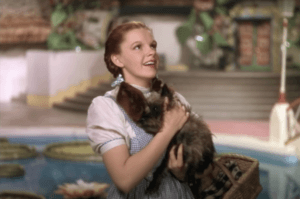To create a more commercial culture, agency leaders must inspire younger generations by balancing inclusion and divisiveness.

As Dorothy says in The Wizard of Oz, “we’re not in Kansas anymore.” Agency leaders of a certain age are gathering in corners to bemoan their struggle to connect with the priorities of younger generations.
You were raised to be relentless and entrepreneurial. But apparently they’re just not wired that way.
It’s not that workplace change is a problem. Quite the opposite – you’re rightly committed to improving diversity, equity and inclusion. But your agency’s struggling to retain its commercial edge.
Clearly that’s an issue for your bottom line, but also for younger talent, not to mention your clients and the wider industry.
So what’s going on? And what can you do?
An unwinnable culture war
The pandemic, economic headwinds and positive societal change have combined to create the perfect storm.
Firstly, clients needed new things, so you needed new talent – especially in data and tech. Wages went bonkers and you struggled to compete on salaries. This in turn led to a healthy but expensive arms race on benefits.
Now your money’s run out, a new arms race has emerged – agency culture.
It’s long been a cliché that people are your biggest differentiator. That sentiment has now evolved from platitude to priority. So transparency, flatter hierarchies and ethical policies have become the front line in the battle for talent.
Unfortunately, this isn’t working out too well.
Losing control of your team
Many CEOs and founders now feel like they’ve lost control. They’re working ever longer hours because they’re the only ones who will. And their stories are tragicomic.
One told me about a young board director who refused to review a time-sensitive RFP on her commute because that was her ‘reading time’.
Another shared how a team member had missed a mandatory all-staff meeting in the office, deploying the epic excuse that he ‘couldn’t find his outdoor shoes’.
Despite being laudably democratic, an overly inclusive new-business qualification process is another common battleground.
At best, hearing everyone’s view will only cost you time. And no-one’s suggesting you work for arms dealers or fascist regimes. But if you’re regularly arguing about leather belts or whether a distant pension fund holds shares in the wrong kind of energy company, then you lack strategic clarity.
Of course you’re sensitive to work / life boundaries, hybrid work and ethical clients. But it turns out that adopting every progressive value or involving everyone in key decisions isn’t super practical.
So rather than bemusement at ‘inmates taking over the asylum’ or shrugging that it’s ‘a generational thing’, it’s time to look inwards.
Something to believe in
Many well-meaning agency leaders now lack conviction. Hybrid work’s loosening of cultural bonds has left you fearful of losing good people. So your appetite for a punchy perspective has ebbed away.
But as well as powering external differentiation, a strong point of view is also a beacon for the right talent.
Unfortunately, by trying to cater to everyone’s values, your precious culture has been diluted. Having rushed to create the broadest church, you’ve accidentally birthed a benign anarchy.
Caught in the modern paradox of tolerating everything except intolerance, the reality is that if you want to stand out, then you can’t be inclusive of everyone.
Thankfully, being inclusive and divisive are not mutually exclusive.
Show up for what matters
Differentiated agencies understand that standing for something isn’t scary. Liberated from the thankless burden of trying to please everyone, you’re free to truly show up for your ‘tribe’.
JUV Consulting is a Gen-Z agency based in New York. Their founder Ziad Ahmed has been running the agency for six years. At 23, he’s Gen Z and so is his team, so he knows the challenges that can pose.
What makes him different is his passion. He knows what matters to him and speaks more like a preacher than a typical CEO. Ziad’s commitment brings people with him. As he puts it, “we are so unapologetically a political company, it’s embedded into everything we do.”
Do you speak like that? Can you name the causes that matter to you – and the ones that don’t? Can you name the brands whose values match your own?
Prioritise competitive advantage
In this fast-changing, economically challenged industry, your agency must battle to win. So a blunted competitive edge represents an existential risk.
Your team’s expectations are evolving at pace and leaders are experiencing a culture shock. What was once unquestioned is now being challenged like never before.
Too many generals are now scared of their troops. You can’t pander people into action, you have to inspire them. The most effective agency leaders we see have real clarity – on who they are, where their agency is going and what matters to them.
Step one is to repeat after me: ‘our agency isn’t for everyone… and that’s okay’.
To sustain your competitive advantage, you must be divisive and inclusive at the same time. Standing for something will attract the right people. Standing for everything will turn them away.
Belonging matters. As Dorothy said, “there’s no place like home.”